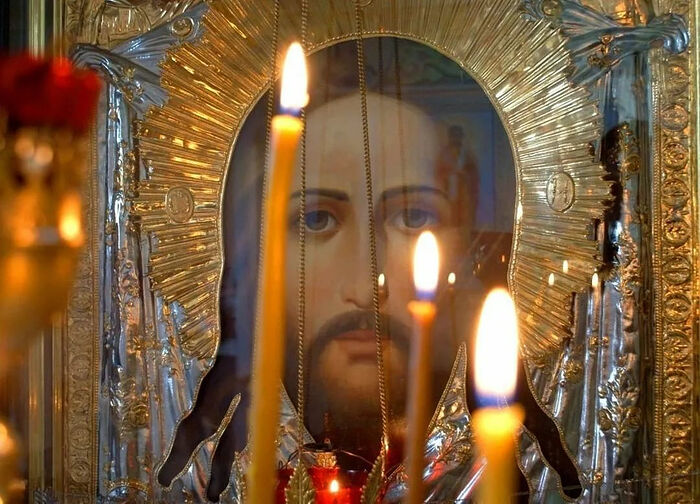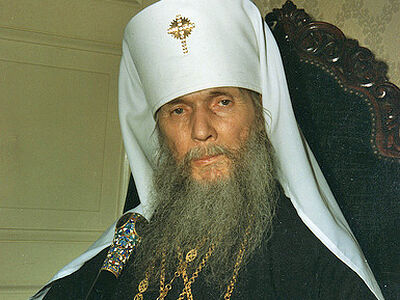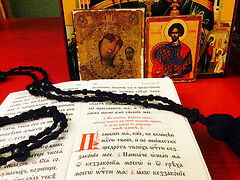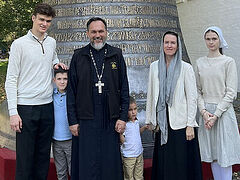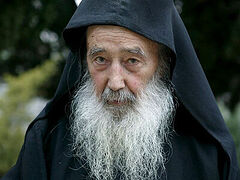The “Our Father” as an exemplar of Christian prayer—The three main parts of the same—Christian prayer as thanksgiving and doxology (especially in the Liturgy)
The Lord’s Prayer is, of course, an example of prayer for us Christians. In examining its composition and substance, we can see that it can be split into three parts: 1) invocation, 2) petition, and 3) doxology. In terms of its inner meaning, it can also be divided into three parts: the first, most important and principal part encompasses invocation and the first three petitions; this is followed by the fourth petition, about “daily bread”; and then, finally, by three petitions about our personal sins.
What should a Christian pray for first of all and above all? About that which he should be seeking above all: “the Kingdom of Heaven and his righteousness” (cf. Mt. 6:33). We see this in the first part of the prayer. In addressing God as the Heavenly Father, a Christian bears witness to the fact that our true fatherland is not on Earth, but in Heaven. “Our citizenship is in Heaven,” the Apostle Paul wrote explicitly (Phil. 3:20). After addressing the Father in this way, the Christian prays for the Name of God to be hallowed—both in each of our private lives, and throughout human history. It is especially hallowed when we, as Christians, make non-believers “glorify the name of our Father who is in Heaven” (cf. Mt. 5:16) by performing good works. Next, the Christian prays for the Kingdom of God to come on Earth.
Looking closely at life, one can see in it a constant struggle between two principles: darkness and light, truth and lies, good and evil. In seeing this, one cannot help but pray for the victory of light over darkness to be manifested in our life and for the Kingdom of God—a Kingdom of righteousness and goodness—to triumph. In the third petition of the Lord’s Prayer, we pray for the will of God to be realized in the life of men, just as it is in the world of Heaven above. The Christian consciousness tells a person firmly and with conviction that trusting in the Will of God is not only our duty, but also genuine wisdom and truth in life. Our Heavenly Father knows what is necessary and beneficial for each of us, and in His infinite love and goodness, desires what is good for us and our salvation more than we do ourselves. This is why the Apostle says: Cast all your care upon Him; for He careth for you (1 Peter 5:7).
The fourth petition in the Lord’s prayer is the only one about our bodily, as opposed to spiritual, needs. We are to ask for our “daily bread”, that is, that which is necessary for our existence, to support our bodily life. As for anything on top of this, “if it is given, then give thanks to God, but if it is not, do not care for it” (excerpt from the Catechesis). Of course, “daily bread” is to be understood here as anything that we require: food, clothing, lodgings, etc. This fourth petition shows us that our earthly life with its “cares and concerns” also comes under the care of our Heavenly Father for us. The Apostle Paul writes: Let your conversation be without covetousness; and be content with such things as ye have: for he hath said, I will never leave thee, nor forsake thee (Hebrews 13:5).
The fifth petition of the Lord’s prayer is about forgiveness of sins. Not only in this petition, but also in other places in His teaching, the Lord states in no uncertain terms that a condition of God’s forgiving our sins is for us to forgive our neighbor theirs. Yet how often this petition is untrue in the eyes of God to Whom we are praying. We read: “Forgive us our debts as we forgive our debtors,” yet in reality, we neither pardon nor forgive, but rather are offended, and nurture a feeling of injury and a desire to get back at the person in our hearts. A Christian thus ought to ask himself each time he reads this petition whether he has forgiven his enemies and injurers. If he has not, he cannot expect to be forgiven by God.
The two final petitions, the sixth and the seventh, are about the same thing: the causes of sin. We first ask for its germs—trials and temptations—to be removed far from us, and then to be delivered from the Evil One, that is, the Devil and progenitor of all sins. People are often afraid of outward misfortunes: failures, illnesses, poverty, etc. Christianity, however, teaches us to fear above all for our immortal souls. The Lord says, And fear ye not them that kill the body and are not able to kill the soul: but rather fear him that can destroy both soul and body in hell (Mt. 10:28). Elsewhere, the Lord, after enumerating outward trials and forms of persecution for the Faith, says explicitly: Rejoice and be glad, for great is your reward in heaven (Mt. 5:12).
On the contrary, a Christian ought to be afraid not of outward misfortunes and calamities, but of his own sins and falls. Everyone knows how we grow used to sin and sin literally every step we take and at every moment in our lives. Sin is a form of lawlessness, a violation of the law of God’s righteousness, and the result of it is thus torment and weeping and gnashing of teeth (Mt. 8:12). The “Our Father” thus keeps our hearts repulsed by these spiritual evils, and we, confessing our weakness and predisposition to sin, ask to be kept from falling into the sins that tempt us and to be delivered from the progenitor of sin, the Devil.
As we know, after these seven petitions, there comes a triumphal glorification of the might, power, and glory of God. This glorification of God’s greatness is also a filial expression of unshakeable and clear certainty that everything for which we ask will be given to us through the love of the Heavenly Father—for His is “the Kingdom, and the power, and the glory, to the ages. Amen.”
Yet the Lord’s prayer is not the only one to conclude with such a doxology. Doxological prayers in their most pure, isolated form (for example, “Praise ye the name of the Lord…”, “Holy, holy, holy…”) are not used so commonly by us. Yet they usually make up the final words of our prayers (especially liturgical prayers) and are often solemn or sacred in character. This is why they are always pronounced (intoned) by someone in holy orders: a priest or a bishop. The most important and exemplary prayers of glorification are the hymns “Gloria to God in the Highest…” (the Great Doxology) and the “We praise Thee O God”. It is chiefly these doxological prayers that ought to be called “exalted and Christian”, since it is in them that the Christian’s love for God and veneration of His supreme perfections is most clearly expressed.
The third type of prayer, thanksgiving, is inextricably linked to this type of doxology. It goes without saying that a Christian who loves God and knows His love, mercy, and the good things that He does, cannot but feel gratitude to Him in his heart. Our most important form of prayerful thanksgiving is our most important church service, the Divine Liturgy. The main part of it, the so-called “Canon of the Eucharist,” opens with the words “Let us give thanks unto the Lord…”. The most pure, bloodless sacrifice, the sacrifice of righteousness, the sacrifice of the Body and Blood of Christ, which is offered at the Liturgy in the sacrament of Holy Communion, though it may be visibly offered by people, is invisibly performed by Christ the Savior Himself, through His grace and almighty power, while being accepted by us people with the reverence of thankful love. This is why, at the most important moment in the liturgy, the priest solemnly intones: “Offering Thee Thine own of Thine own, on behalf of all and for all…”, and the faithful (or the choir, standing in for them) reply with a hymn of thanksgiving: “We hymn Thee, we bless Thee, we worship Thee, O Lord, and we pray unto Thee, O our God.”

